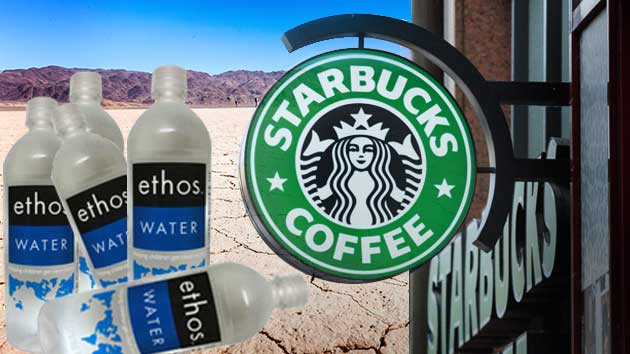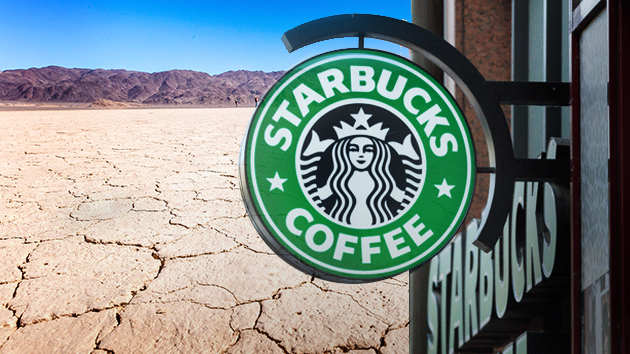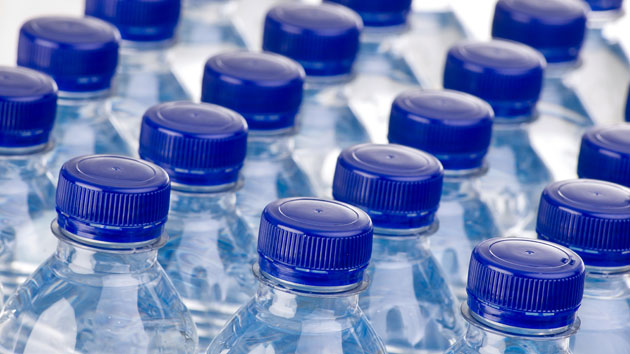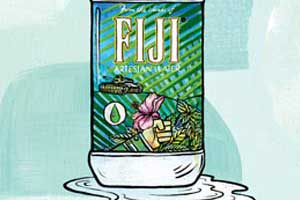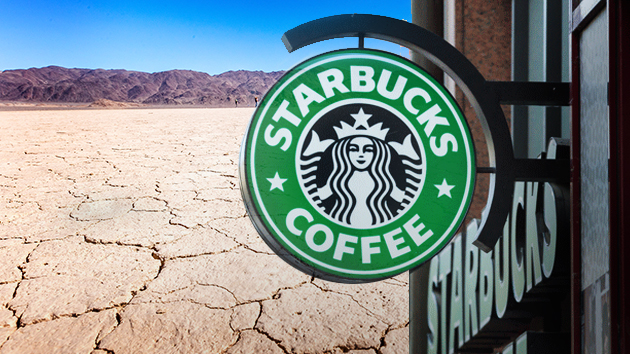
<span class="byline photo-byline"><a href="http://www.shutterstock.com/cat.mhtml?lang=en&language=en&ref_site=photo&search_source=search_form&version=llv1&anyorall=all&safesearch=1&use_local_boost=1&search_tracking_id=p3O5EnT2nc6tK48hfu5P5g&searchterm=starbucks%20&show_color_wheel=1&orient=&commercial_ok=&media_type=images&search_cat=&searchtermx=&photographer_name=&people_gender=&people_age=&people_ethnicity=&people_number=&color=&page=1&inline=238209706" target="_blank">Bocman1973</a>/Shutterstock; Spondylolithesis/iStockphoto</span>
Update, September 5, 2015: In a response to Mother Jones after publication of this post, a Starbucks representative stated, “We still have limited production coming from Merced that is supplying only our stores in California.” Ethos Water’s Pennsylvania bottler is supplying stores in other states as the company works on securing a replacement for the California source. Additionally, the representative said that even though Sugar Pine has been listed as a source for Ethos Water on the bottle’s label for several years, “we never needed to source water from there,” and that Ethos has only used the other source listed on the label, Baxter, also in the Sierra Nevada foothills.
Sugar Pine Spring Water, a California company listed as a certified source on Starbucks’ bottled water labels, was hit on Tuesday with a complaint and draft cease-and-desist order by the California State Water Resources Control Board (SWRCB) for alleged illegal diversion and bulk delivery of water in 2014 and 2015. It’s the first enforcement action taken against a bottled-water supplier since the state declared a drought emergency in January 2014.
As I reported this spring, Starbucks’ Ethos Water brand has sourced water sold in the chain’s western US stores from suppliers tapping the foothills of the Sierra Nevada mountains, areas the US Drought Monitor has declared to be in “exceptional drought” conditions. Starbucks subsequently announced it would be phasing out its use of California water over the next six months. Mother Jones asked Starbucks whether it was still using water from Sugar Pine Spring Water, but the company has not yet responded.
Ethos Water has long been produced in a Safeway bottling plant in Merced, California, that lists Sugar Pine water as one of two California sources for the Starbucks brand.
The SWRCB notified Sugar Pine owner Scott Fahey in 2014 “that there was not sufficient water to continue diverting under his permit,” and the company was again notified in April 2015. After Sugar Pine delayed making its water collection site available to SWRCB agents for inspection, government personnel deployed surveillance cameras on public roads around the locked site to capture images of tankers accessing the property. The cease-and-desist order says that between July 12 and August 5 of this year, 99 tanker trucks were counted accessing the water transfer station, which SWRCD staff estimated to contain about 653,400 gallons of water just in that time period.
Sugar Pine taps into several springs joined by more than five miles of underground pipes that cross a mixture of private and state-owned land. The SWRCB complaint notes that Sugar Pine taps into water sources that drain into the Tuolumne River watershed and the Don Pedro Reservoir, sources relied on by the city of San Francisco and area farmers.
The company has 20 days to request a hearing. If it doesn’t, the state will issue a final cease-and-desist order, which carries a fine of up to $10,000 a day or referral to the attorney general. Fahey’s attorney declined to comment to the Associated Press, which reported that “he anticipates a hearing before the state water board.”
California’s Division of Water Rights staff is recommending a fine of $224,875 to settle the complaint.
From our original investigation, a little more context:
Ethos Water was supposed to help fix the global water crisis: Founded in 2002 in Southern California, the bottled-water company promised that for every unit it sold, it would donate a small amount of money to water charity projects in the developing world.
The idea quickly took off. In 2005, Ethos was acquired by Starbucks. Now, for every $1.95 bottle of Ethos water it sells, Starbucks makes a 5-cent donation to the Ethos Water Fund, part of the Starbucks Foundation. “When our customers choose to buy Ethos Water, they’re improving the lives of people who lack vital resources,” Starbucks CEO Howard Schultz said in 2008.
Some of the biggest celebrities in Hollywood have lent their names to Starbucks’ Ethos brand. Matt Damon starred in an ad campaign, and Starbucks partnered with a company that drives celebrities to the Oscars and filled the cars with Ethos bottles, “so Leonardo DiCaprio and Cameron Diaz walked into the awards carrying Ethos Water,” as Ethos cofounder Peter Thum explained. In 2011, Ethos’ other cofounder, Jonathan Greenblatt, became special assistant to the president and head of the White House Office of Social Innovation and Civic Participation. Obama himself lauded Greenblatt last fall for his “innovative solutions to America’s challenges.”
Starbucks says that its partnership with Ethos has raised more than $12.3 million for water charity projects to date.
So far, media coverage has focused on Starbucks’ goal to quench the thirst of the world’s parched masses; the story behind the bottled water it sells here in the United States has been a nonissue. But now, as California’s historic drought wears on, Starbucks is facing a water crisis of its own.
The bottling plant that Starbucks uses for its Ethos customers in the western United States is located in Merced, California, which is currently ranked in the “exceptional drought” category by the US Drought Monitor. Its residents face steep water cuts in their homes, and surface water for the region’s many farms is drying up.
Read the full investigation here.
